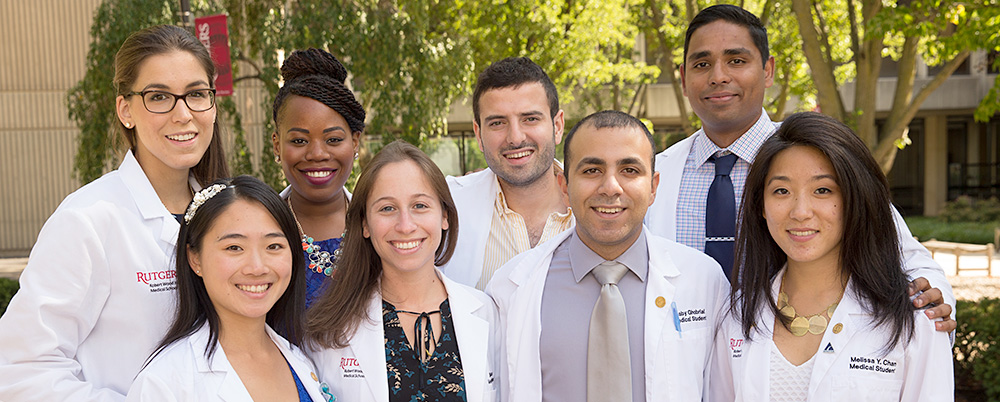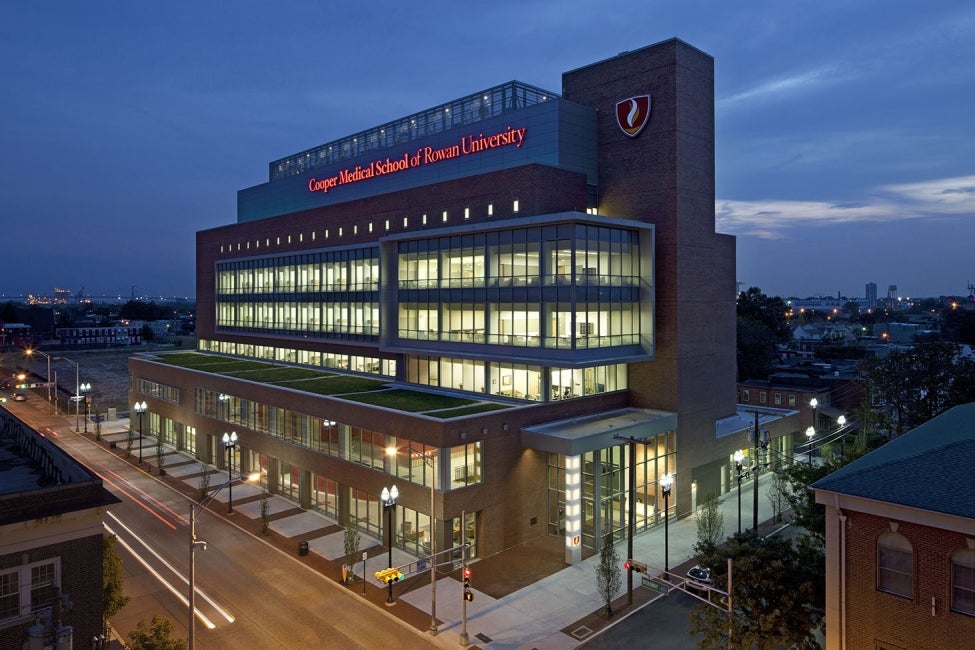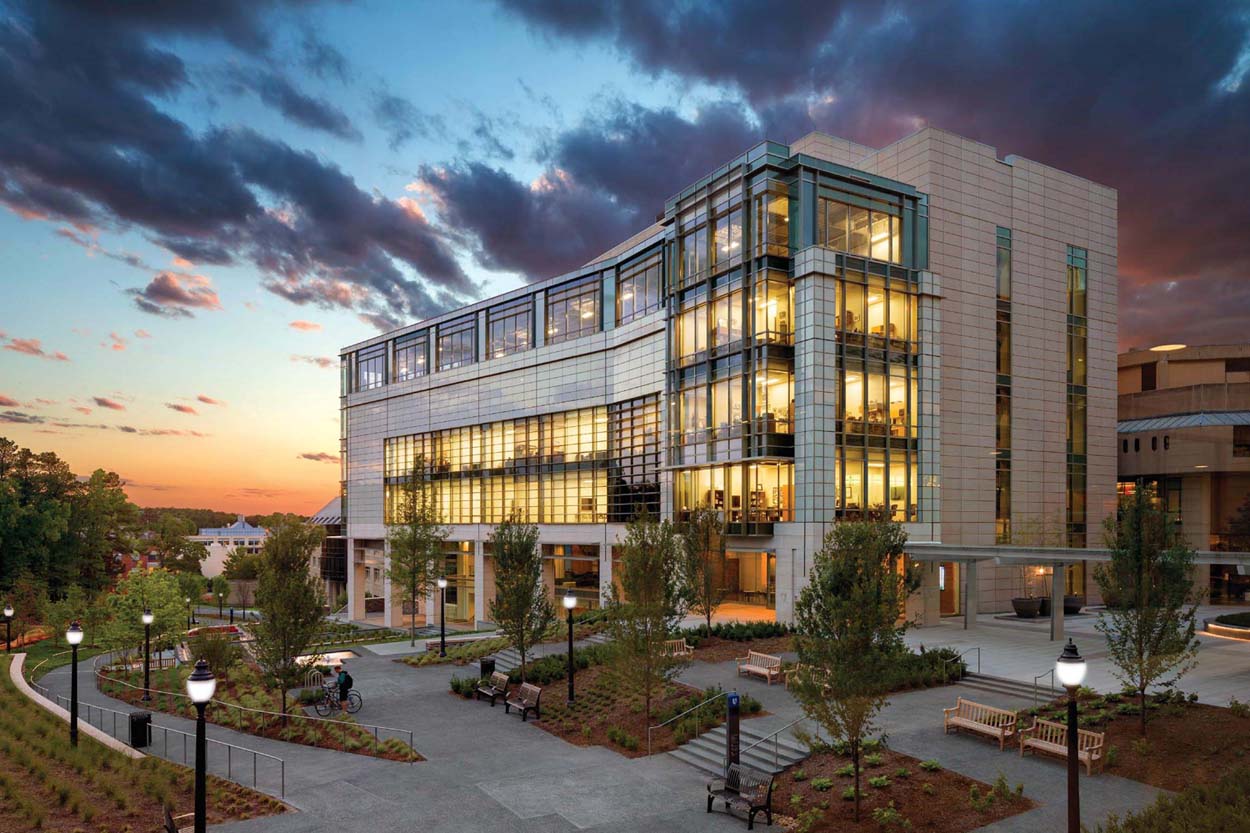Ranked the best and second-best New Jersey medical school by multiple sources, the Rutgers Robert Wood Johnson Medical School is a diverse, community-oriented institution affiliated with regional research powerhouses like the Rutgers Cancer Institute of New Jersey and Robert Wood Johnson Hospital.
It’s no wonder that aspiring physicians in the Northeast hear about RWJMS when they ask, “what are good medical schools near me?” But what does it take to get into RWJMS?
Be an Informed Applicant
Many things stand out to every medical school admissions committee — high GPA, excellent MCAT scores, compelling pre-med experiences, etc. But medical school applications are not one-size-fits-all. Each medical school has a distinct institutional identity, selection factors, and admissions guidelines.
This article organizes key information and insights about Robert Wood Johnson Medical School to help you effectively focus your application and make an impactful case for your candidacy. However, nothing beats one-on-one guidance. Our medical school admissions consulting has helped thousands of diverse students get into top medical schools across the country. Whether you need help with an overall application strategy, assistance optimizing your application materials, or have unique circumstances you can’t find advice about elsewhere — IMA’s admissions consulting can help you get into the medical school of your dreams.
This article contains:
- Why Robert Wood Johnson Medical School?
- Medical Programs at RWJMS
- Special Admissions and Summer Programs
- Selection Factors: What Robert Wood Johnson Medical School Looks for in a Candidate
- Admissions Requirements
- Admission Statistics
- AMCAS Primary Application and RWJMS Secondary Application
- RWJMS Secondary Application: Essay Prompts, Sample Answers, and Advice
Why Robert Wood Johnson Medical School?
The Robert Wood Johnson Medical School excels in many important areas of medical education. The school offers abundant research opportunities to students and is affiliated with the Rutgers Cancer Institute of New Jersey. Community and global health initiatives are significantly woven into RWJMS’s curricular and extra-curricular offerings. The school recently launched a new curriculum, attracting regional medical school applicants looking for a contemporary patient- and community-oriented medical education.
Rutgers Cancer Institute of New Jersey
A research and cancer treatment institution, the Rutgers Cancer Institute of New Jersey is the only comprehensive cancer center in the state. In addition to delivering adults and children comprehensive cancer care and conducting population, prevention, clinical, and laboratory research, the center functions as a teaching hospital for students at RWJMS. The center sees over 120,000 patient visits a year and receives $99 million in research grants annually.
Robert Wood Johnson Hospital
The Robert Wood Johnson Hospital is located next to Rutgers Cancer Institute of New Jersey, with an additional campus in Somerville, NJ, and is the primary teaching hospital of RWJMS. The hospital includes cancer care and cardiovascular centers and a children’s hospital. Robert Wood Johnson Hospital has consistently ranked in the top 50 nationally in numerous fields such as urology, cardiology and heart surgery, respiratory disorders, geriatrics, and cancer.
Robert Wood Johnson Medical School Ranking
First, here are the 2023 medical school rankings for Robert Wood Johnson Medical School according to U.S. News and World Report:
- #68 in Best Medical Schools: Research
- #94 in Best Medical Schools: Primary Care
- #28 in Most Diverse Medical Schools
- #141 in Most Graduates Practicing in Primary Fields
- #153 in Most Graduates Practicing in Medically Underserved Areas
- #129 in Most Graduates Practicing in Rural Areas
In 2021, the College Gazette named RWJMS the second best medical school in New Jersey. The publication cites the school’s achievements in diversity and higher-than-average residency match rates.
Med-Colleges.com rates the overall medical education programming at RWJMS and provides state, regional, and national rankings for the school.
- Overall rating: 5/5
- Curriculum rating: 5/5
- Teaching rating: 5/5
- Safety rating: 1.5/5
Med-colleges.com ranks RWJMS as the best New Jersey Medical school and #19 in the Northeast.
RWJMS tops a number of categories for New Jersey medical schools:
- Best General Medicine School
- Best Microbiology & Immunology School
- Best Biomedical Sciences School
- Best Public Health School
- Best Health Care Administration School
- Best Health Services School
- Best Neurobiology & Neurosciences School
- Best Nutrition & Dietetics School
- Best Surgical Technology School
- Best Sonography & Ultrasound School
- Best Physical Therapy School
- Best Physiology & Pathology School
In regional rankings, RWJMS occupies top spots in many categories. The New Jersey medical school is ranked Best Sonography & Ultrasound School, Second Best Radiologic Technology School, and Third Best Surgical Technology School in the Northeastern U.S.
MD Program at RWJMS
The mission of RWJMS’ MD program is stated as follows:
“Rutgers Robert Wood Johnson Medical School (RWJMS) is dedicated to transforming health care for New Jersey and the nation through innovation and excellence in education, discovery, patient and family-centered care and addressing the health of our diverse community.”
RWJMS strives to produce adaptable and practical physicians who skillfully navigate an ever-changing healthcare landscape with ethical, patient-centered practices.
Curriculum
In 2021, RWJMS launched its new MD curriculum, the “5 Cs Curriculum.” The five Cs are Curiosity, Critical Thinking, Clinical Skills, Competence, and Compassion.
The longitudinal themes of the curriculum focus on:
- Health Systems Science
- Evidence Based Medicine
- Patient and Family Centered Care in the Community Context
An in-depth rundown of the MD curriculum can be found https://rwjms.rutgers.edu/education/medical_education/curriculum/overview.
Community Health Initiatives
The RWJMS Community Health Initiatives emphasize the necessity to promote health across entire communities and families. The school provides resources to students and staff to engage with underserved populations throughout the state of New Jersey.
Community Health Initiatives at RWJMS include:
- The Homeless and Indigent Population Health Outreach Project
- Eric B. Chandler Health Center – a health center for low-income residents
- Promise Clinic – a student-run clinic that serves clients of local soup kitchens
Summer Research
MD students have many opportunities to gain experience in and contribute to medical research at RWJMS. These research programs build upon key components of the MD curriculum and advance student skillsets in scientific reasoning and laboratory skills.
Distinction Programs
MD students can pursue distinctions in:
- Bioethics
- Global Health
- Leadership in Academic Healthcare
- Medical Education
- Medical Innovation and Entrepreneurship
- Research
- Service to the Community
These rigorous and prestigious programs are open and offer support to MD students who show exceptional scholarship, accomplishment, and involvement in distinct areas of medicine.
Other Medical Programs at RWJMS
There are many other opportunities for medical education at RWJMS in addition to the four-year MD program.
Dual Degrees
Here’s a rundown of the dual MD degree programs offered at Robert Wood Johnson Medical School.
MD/PhD – This program trains students to become physician-scientists who can contribute to advances in both patient care and biomedical research. PhD studies take place at the Graduate Program in Molecular Biology at Princeton University, the Graduate School of Rutgers University, and the Graduate School of Biomedical Sciences Piscataway Campus. Arrangements can be made for students to study at the School of Public Health. MD/PhD students pursue three years of graduate studies between the second and third years of medical school.
MD/MPH – This program awards an MD and a master’s in Public Health. Students in their first and second years of medical school may begin taking courses in public health in the evening or over the summer while attending the MD program. A year of dedicated graduate-level public health studies is usually taken between the second and third or third and fourth years of medical school. However, it is possible to complete the program within four years.
MD/MBA – This program is designed for students who want to pursue a career in medicine with an emphasis on business or management. MBA coursework is taken at the Rutgers School of Business New Brunswick campus. First-year medical students may apply to the program and MBA classes begin the summer following the first year of the MD curriculum. MD/MBA students are enrolled full-time in the School of Business in the second year. This dual degree takes five years to complete. In addition to the MD curriculum, students study management strategies, business law, information technology systems, statistics, marketing strategy, decision analysis, finance, economics, and accounting.
MD/JD – This program is provided in collaboration with the Rutgers School of law and offers an opportunity for medical students to earn an MD and a Master of Science in Jurisprudence in five years. Classes in law begin the summer following the first year of medical school, after which a full year of legal studies and health law is taken.
MD/MSCTS – The MD and MS in Clinical & Translational Science dual degree trains students in both clinical medicine and the methods of clinical and translational research. The Master of Science in Clinical & Translational Science is offered in collaboration with the Rutgers Graduate School of Biomedical Sciences.
Pre-med Programs
The Rutgers Robert Wood Johnson Medical School offers two pre-med programs for undergraduate students pursuing careers in medicine.
Biomedical Careers Program – The Biomedical Careers Program (BCP) is a summer program that helps undergraduate students who want to become doctors. The program offers a variety of classes, activities, and workshops on medicine and medical school. These include student wellness activities, career and professional development workshops, patient-simulated clinical modules, academic support and success seminars, and science classes. BCP actively recruits students from educationally disadvantaged, underrepresented, and low-income backgrounds.
Summer Science Scholars’ Academy – The Summer Science Scholars Academy is a program for high-achieving secondary school students who want to learn more about the human body. The program has lectures, labs where you can see organs, and opportunities to see what it’s like to work in the health field. You also get to learn about different aspects of public health. The program is for current or soon-to-be high school seniors. The Summer Science Scholars’ Academy is three weeks long.
Special Admissions Programs
This section covers all the accelerated acceptance and special admissions programs available at RWJMS.
Accelerated Acceptance with Post-Baccalaureate Programs – RWJMS has accelerated acceptance programs in coordination with many graduate schools in the region. Participating schools include Lasalle University, Drexel University, New York University, Bryn Mawr College, Johns Hopkins University, Columbia University, University of Pennsylvania, and Rutgers University. Students must have a GPA above 3.6 and are encouraged to contact the admissions office for more information.
PharmD/MD Program – This highly selective program trains interdisciplinary practitioners able to combine medicine and pharmacy to provide leadership in the pharmaceutical industry, public policy, academic research, and collaborative clinical practice. The program is coordinated by committees from the Ernest Mario School of Pharmacy and the RWJ Medical School. Pharmacy students who are accepted into the program will begin the MD curriculum following the PharmD program and are not required to take the MCAT.
Joint Bachelor and Medical Degree Program – Rutgers Honors College and RWJMS offer a unique academic track that emphasizes global health and interdisciplinary practice. This program allows students to do undergraduate coursework with support such as academic advising, opportunities to shadow doctors, and mentorship from medical school students. There will also be chances for the students to take special undergraduate courses. Additionally, students get involved in Global Public Health initiatives and projects with local and international partners.
Joint Bachelor and Medical Degree Program – The Rutgers University/Robert Wood Johnson Medical School Joint Program is a program that allows you to study basic medical sciences in your undergraduate years and graduate with both a bachelor’s and medical degree in seven or eight years. Students apply to the program in their fourth semester at Rutgers University and, if selected, will obtain both degrees after seven or eight years.
Access-Med Program – The Access-Med program is a joint program between The State University of New Jersey, Seton Hall University, Rutgers Robert Wood Johnson Medical School, and Rutgers University. The program is designed to increase the number of students from disadvantaged backgrounds who go into medicine. The program offers biannual pre-medical conferences, career counseling, and academic support.
Academic Clinical Experiences Summer Program (ACES) – The ACES program is a partnership between Rutgers Robert Wood Johnson Medical School (RWJMS), Princeton University, and other organizations. The program helps students transition from undergraduate studies to medical school. Students in the program have a summer experience after their sophomore year, mentoring, and other support to help participants be successful in their medical education.
Selection Factors: What Robert Wood Johnson Medical School Looks for in a Candidate
The admissions committee at Robert Wood Johnson Medical school conducts a holistic review of each candidate. This means that they will look at your entire application to get a sense of who you are as a person, what kind of contributions you will make to the RWJMS community, and how successful you will be as a future physician.
This section details specific qualities and experiences that the admissions committee at RWJMS looks for in an applicant.
Students are selected based on their academic pursuits, meaningful engagement in diverse activities, unique life experiences, and the following personal competencies:
- Social/Interpersonal and Team Skills
- Resilience and Adaptability
- Orientation to Service
- Desire to Learn and Capacity to Learn
- Sensitivity to Diversity and Cultural Competence
- Reliability and Responsibility
- Integrity and Ethics
When applying to RWJMS and making a case that you possess these competencies, it’s important to provide evidence and examples. This is where your personal statement, secondary essays, and letters of recommendation come in.
Let’s take a brief look at each of the competencies desired by the RWJMS admissions committee.
Social/Interpersonal and Team Skills – The admissions committee wants to see that you can work well with others and be a team player. They want to know that you have the social skills necessary to interact with patients, families, and other healthcare providers. This is an important competency for medical students because it is essential for successfully working in the healthcare field.
In your application, you can discuss a time when you had to work with others to achieve a common goal or had to deal with a difficult interpersonal or social situation. You can also talk about experiences you have had working in a team setting.
Resilience and Adaptability – The admissions committee wants to see that you are resilient and can adapt to change — that you can handle the rigors of medical school and the challenges that you will face as a physician. This is an important competency because it is essential for successfully dealing with the stress of medical school and the demands of a career in medicine.
In your application, you can discuss a time when you had to overcome a difficult situation or faced a significant challenge. You can also talk about how you’ve handled change in your life, coped with adversity, and what these experiences have taught you.
Orientation to Service – The admissions committee wants to see that you are committed to serving others and have a desire to help those in need. They want to know that you understand the importance of giving back to the community and that you will be a caring and compassionate physician.
In your application, you can discuss your motivation for becoming a physician and your commitment to serving others. You should highlight your experiences volunteering, working with underserved populations, and participating in community service activities.
Desire to Learn and Capacity to Learn – Successful physicians and medical students must have a desire to continue learning and are able to effectively learn new information. The admissions committee wants to see that you have a strong interest in medicine and that you can learn the material necessary to be successful in medical school and as a physician.
In your application, you can discuss your motivation for studying medicine and your commitment to lifelong learning. You should highlight experiences where you have had to learn new information or skills, such as research projects, coursework, or extracurricular activities, as well as how you handled the challenges and what you found rewarding.
Sensitivity to Diversity and Cultural Competence – Medical students must be aware of and sensitive to the diverse needs of patients and their families. They must also be culturally competent to provide care that is appropriate for the patient’s cultural background.
In your application, you can discuss your experiences working with people from diverse backgrounds and your commitment to providing culturally competent care. You should highlight experiences where you have had to learn about and understand different cultures, such as volunteering in a healthcare setting that serves a diverse patient population or participating in a study abroad program.
Reliability and Responsibility – The admissions committee wants to see that you are reliable and can be counted on to follow through on your commitments. They want to know that you will be a responsible medical student and physician who can be trusted to act in the best interests of patients, families, and the healthcare team.
In your application, you should discuss your experiences exhibiting reliability and responsibility, such as holding a leadership position in a club or organization, working a part-time job, or taking care of your family. You can also talk about how you have handled situations where you have been faced with difficult choices or had to make decisions that affected others.
Integrity and Ethics – As a future physician, you will be expected to adhere to the highest standards of ethical behavior. The admissions committee wants to see that you have strong moral character and that you will act with integrity in all aspects of your life.
In your application, you can discuss your personal values and how they have guided your decisions in the past. You should also talk about any experiences you have had that have challenged your ethics, such as working with a difficult patient or participating in research.
In addition to the personal competencies, RWJ Medical School admissions provides the following list summarizing the key factors in the school’s selection process:
- Character
- Motivation
- Extracurricular involvement
- Pre-professional committee evaluations
- Academic achievement in a balanced undergraduate education
- Results of the MCAT
- Interview
Finally, there are some undergraduate courses you can take to boost your application. We go into the required coursework in the section below. The following coursework is not required but is recommended by admissions:
- Biostatics
- Cell and Molecular Biology
- Anatomy and Physiology
- Spanish
- Courses that study social and cultural factors of well-being
Admissions Requirements
Applicants are expected to have a bachelor’s degree before enrolling and may apply to RWJMS once three years of undergraduate coursework (or 90 credits) have been completed.
Required Coursework
- Physics (with lab): 2 semesters
- Biochemistry: 1 semester
- Organic Chemistry (with lab): 1 semester
- Inorganic or General Chemistry (with lab): 2 semesters
- Biology or Zoology (with lab): 2 semesters
- College Mathematics: 2 semesters (one semester may be a statistics or biostatistics course)
- English: 2 semesters (at least one semester of a writing course)
Letters of Recommendation
Admissions requires a pre-med committee evaluation or three letters of recommendation from professors. You may submit up to ten letters. Extra letters don’t have to be written by professors. If you’re a nontraditional student who has not been in school for over two years, admissions prefers letters from people with recent exposure to your skillset, character, and academic ability.
A good letter of recommendation is written by someone who knows you well and can attest to your skills and qualities. Letters should be submitted electronically through AMCAS.
CASPer
CASPer is an online assessment that has been used as a tool to evaluate non-cognitive skills and interpersonal characteristics. All applicants are required to take the CASPer test after receiving the secondary application. The CASPer test is titled CSP-10111-U.S and is taken online.
GPA and MCAT Score
RWJMS all but requires applicants to have a minimum GPA of 3.0 and an MCAT score of at least 498. Each section of the MCAT but have a score of 123 or higher.
While admissions conducts holistic reviews of each applicant, they “look for applicants to have” the above GPA and MCAT scores.
Clinical Experience
Robert Wood Johnson does not require a minimum amount of pre-med clinical experience to apply. We recommend at least 100-150 hours of clinical experience for medical school applicants.
International Medical Aid’s pre-med shadowing study abroad program is a great way to gain diverse and impactful clinical experience while helping others. Our alumni have gone on to top medical schools across the country in part because of the wealth of knowledge and experience our programs provide. The heart of our program puts you side-by-side with experienced and inspiring physicians working with limited resources to provide quality care to medically underserved populations. Harvard medical online courses, optional studies in numerous medical specialties, service-learning experiences, and medical school admissions consulting are just some of the other exciting aspects of our pre-med shadowing study abroad program.
RWJMS Admission Statistics
The most recent statistics from RWJ Medical School come from the class profile from the entering class of 2021:
- Median MCAT: 512
- Average GPA: 3.64
- Over 60% graduated with a bachelor’s degree a year or more before applying
Robert Wood Johnson Medical School Acceptance Rate
The school has not published acceptance rates in recent years. Many report acceptance rates between 5.4% and 11%, with most sources settling on an acceptance rate of 8%.
The average acceptance rate for all medical schools in the U.S. is typically around 6% in recent years.
AMCAS Primary Application and RWJMS Secondary Application
The first step to apply to Robert Wood Johnson Medical School is to complete and submit your primary application. Like most medical schools, RWJMS uses the American Medical College Application Service (AMCAS) for primary applications.
Your primary application is submitted to all the medical schools you wish to apply to. Once a school has received your application and confirmed you meet the minimum admissions requirements, you will be sent an invitation to complete a secondary, school-specific application.
For more details, see our article on the subject: Primary vs. Secondary Applications: Understanding the Difference.

RWJMS Secondary Application: Essay Prompts, Sample Answers, and Advice
The secondary application is a crucial opportunity to present your candidacy in your own words and tell the admissions committee what you’re passionate about, what experiences have shaped you, and why Robert Wood Johnson is the right place for you.
There are a few things to keep in mind as you approach your secondary application essays:
- Be genuine. Admissions committees can spot a generic, cookie-cutter essay from a mile away. They want to know who you are, what motivates and inspires you, and what sets you apart from the rest of the applicants. This is your chance to really let your personality and experiences shine and show the admissions committee what kind of medical student you will be.
- Be concise. Keep your essays to the point. You have a limited word count, so make sure every word counts. Being concise in your writing will increase readability, leave a clearer impression, and allows you to include more information by forgoing long-winded statements.
- Be specific. Generalities and platitudes won’t stick with the admissions committee. Be as specific as possible in your essays, using concrete examples and personal anecdotes to illustrate your points. This will make your essays more memorable and give the admissions committee a better sense of who you are as a person.
Essay #1
Please use this space if you would like to provide additional information to the admissions committee. You may choose to elaborate on or clarify details you have previously provided. (1250 characters)
Without repeating information from your primary application, this essay gives you an opportunity to expand on your experiences, motivations, or any other information you feel the admissions committee should know about you.
Since you have a limited word count, focus on one or two key points that you want to make sure the admissions committee is aware of. You can talk about anything from your academic record to your clinical experiences to your personal background.
This is also a good opportunity to explain what you will be doing in the time between applying and enrolling. If there are courses you will be completing or pre-med activities you’ll be engaged in during a gap year, here’s your chance to explain your plans.
This is a very broad prompt, so choose your focus wisely. In the sample response below, the applicant decides to elaborate on their dedication to the pediatrics profession. They use their internship with IMA as a centerpiece and elaborate on the experience, how it motivated them, and how it demonstrates their commitment to the field.
“If there’s one thing my fellow students and professors know about my motivation to pursue medicine, it’s my passion to provide compassionate care to children. As a child, I was always scared of going to the doctor. Many people I talked to had similar experiences of feeling anxious in a medical setting. I want to be the doctor that changes that for children, providing them with the care and compassion they deserve.
I’m grateful to have had the opportunity to put my passion into action through my internship with IMA, a nonprofit organization that provides free medical care and education to underserved communities globally. In addition to shadowing physicians and participating in enlightening pediatrics learning sessions, I worked with others to help educate children on proper hygiene and sanitation practices as well as basic health concepts. We also worked together to treat illnesses and minor injuries.
Through my experience at IMA, I saw firsthand how a little compassion and listening can go a long way in easing a child’s fears. It was also incredibly rewarding to see the positive impact we were having on the children’s lives. This experience only reaffirmed my commitment to pursuing pediatrics and I hope to continue learning through serving others.”
Essay #2
Please feel free to comment on any course grades, GPA trends, or MCAT scores and what you have learned about yourself. (1250 characters)
This essay gives you an opportunity to address any potential concerns the admissions committee may have about your academic record. If you don’t have any problem areas to address, you can use this space to discuss what you’ve done to succeed academically and how those skills will serve you in medical school and beyond.
If you have a low GPA or MCAT score, this is your chance to explain what happened and why you don’t think it’s indicative of your future academic performance. You can also talk about any steps you’ve taken to improve your academic record, such as taking extra courses or doing research.
If you have a strong academic record, this is your chance to highlight any aspects of your academic history that you’re particularly proud of. You can also talk about what you’ve learned from your academic experiences and how they’ve prepared you for medical school.
However, it’s important to remember that this space is best used to express something about yourself beyond the numbers. Whether you’re explaining challenges that led to low grades or skills that helped you keep good ones, use this prompt to illustrate how you meet one or more of RWJMS’ target competencies. Those competencies are listed above in the “Selection Factors” section, but here they are again for convenience:
- Social/Interpersonal and Team Skills
- Resilience and Adaptability
- Orientation to Service
- Desire to Learn and Capacity to Learn
- Sensitivity to Diversity and Cultural Competence
- Reliability and Responsibility
- Integrity and Ethics
Of course, there are plenty of other traits that predict success in medical school, but these are the ones specifically indicated by the admissions committee at Robert Wood Johnson.
When thinking about how to discuss your academic trends, reflect on the competencies listed above. Do you have a story about how you’ve demonstrated one or more of these qualities? What did you learn from the experience? How will that knowledge help you in medical school and beyond and how did the experience affect your approach to academics?
Your answer to this prompt should be honest and concise. The admissions committee is looking for insight into your character, not a list of your accomplishments. In other words, if you’re response requires an explanation of a downward GPA trend, focus on how you learned from the experience and what you did to mitigate the damage, not on the awards or recognition you received despite it. Although other accomplishments can be mentioned, you want to show that you take responsibility for your actions and learn from your mistakes.
Essay #3
If you are applying with a state of legal residence that is not NJ, please indicate your connection to NJ and explain this connection. (1250 characters)
If you’re not a resident of New Jersey, take a moment to explain your connection to the state in this essay. Some common examples include attending college in New Jersey, having family who live in the state, or working in a healthcare setting in New Jersey.
Whatever your connection to New Jersey may be, you’ll need to explain how it has influenced your decision to apply to RWJ Medical School. Are there specific reasons why you want to attend a medical school in New Jersey? What do you think you can gain from the experience that you wouldn’t be able to get at another medical school?
Be sure to be specific in your answer. The admissions committee wants to know that you have thought about why you’re applying to RWJMS and that you understand what the school has to offer. Mentioning specific teaching hospitals, programs, courses, or research opportunities will show that you’ve done your research and that you’re serious about attending the school.
Good Luck to You!
We hope this guide was helpful in getting you started on your journey to becoming a medical student. The admissions process is long and competitive, but if you stay focused and work hard, you’ll be one step closer to achieving your goal of becoming a doctor. Please reach out to us with any questions, big or small.
We have a large catalog of medical school guides just like this. If you’re wondering, “are there more guides on medical schools near me?” then check out the list below:
- Cooper Medical School of Rowan University (CMSRU)
- A.T. Still University Kirksville College of Osteopathic Medicine
- Saint Louis University School of Medicine
- University of Missouri Medical School
- Kansas City University (KCU)
- UMKC School of Medicine
- New York Medical College
- University of Pittsburgh School of Medicine
- University of Wisconsin Medical School
- VCU School of Medicine
- University of Maryland School of Medicine
- Case Western Medical School
- University of North Carolina Medical School
- University of Florida Medical School
- Emory University School of Medicine
- Boston University College of Medicine
- California University of Science and Medicine
- UC San Diego Medical School
- California Northstate University College of Medicine
- Touro University of California
- CHSU College of Osteopathic Medicine
- UC Davis School of Medicine
- Harvard Medical School
- UC Riverside School of Medicine
- USC Keck School of Medicine
- UT Southwestern Medical School
- Long School of Medicine at UT Health San Antonio
- University of the Incarnate Word School of Osteopathic Medicine
- UT Austin’s Dell Medical School
- UTMB School of Medicine
- McGovern Medical School at UT Health
- Johns Hopkins School of Medicine
- McGovern Medical School at UT Health
- The University of Texas Rio Grande Valley School of Medicine
- UNT Texas College of Osteopathic Medicine
- University of Houston College of Medicine
- Texas A&M College of Medicine
- Johns Hopkins Medical School
- Baylor College of Medicine
- George Washington University School of Medicine
- Vanderbilt University School of Medicine
- St. George’s University School of Medicine
- Lake Erie College of Osteopathic Medicine (in Pennsylvania)
- Sidney Kimmel Medical College at Thomas Jefferson University
- Wake Forest University School of Medicine
- Western University of Health Sciences (in California)
- Drexel University College of Medicine
- Stritch School of Medicine at Loyola University Chicago
- Georgetown University School of Medicine
- Yale School of Medicine
- Perelman School of Medicine
- UCLA Medical School
- NYU Medical School
- Washington University School of Medicine
- Brown Medical School
Thank you for reading and good luck to you on your journey to becoming a physician!









